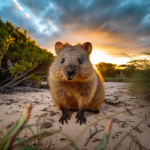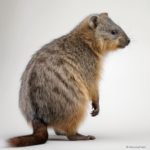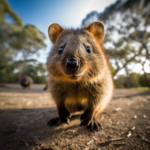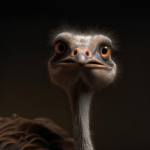Quokkas, also known as the happiest animals on Earth, have gained quite a reputation for their adorable smiles and friendly nature. These small marsupials are native to Western Australia and have become popular among tourists and nature enthusiasts. However, there is a common question that arises when encountering these cute creatures: are quokkas dangerous? In this article, we will explore the behavior and characteristics of quokkas to determine whether they pose any threat to humans or other animals. So, let’s delve into the world of quokkas and find out if they are as harmless as they appear.
Key Takeaways
- Quokkas are generally not dangerous and are known for their friendly and curious nature.
- They are small marsupials native to Western Australia and are often referred to as the “happiest animal on Earth.”
- While they may approach humans and appear friendly, it is important to remember that they are wild animals and should not be approached or fed.
- It is crucial to respect their natural habitat and maintain a safe distance to ensure their well-being and your own safety.
Understanding Quokkas: A Brief Overview
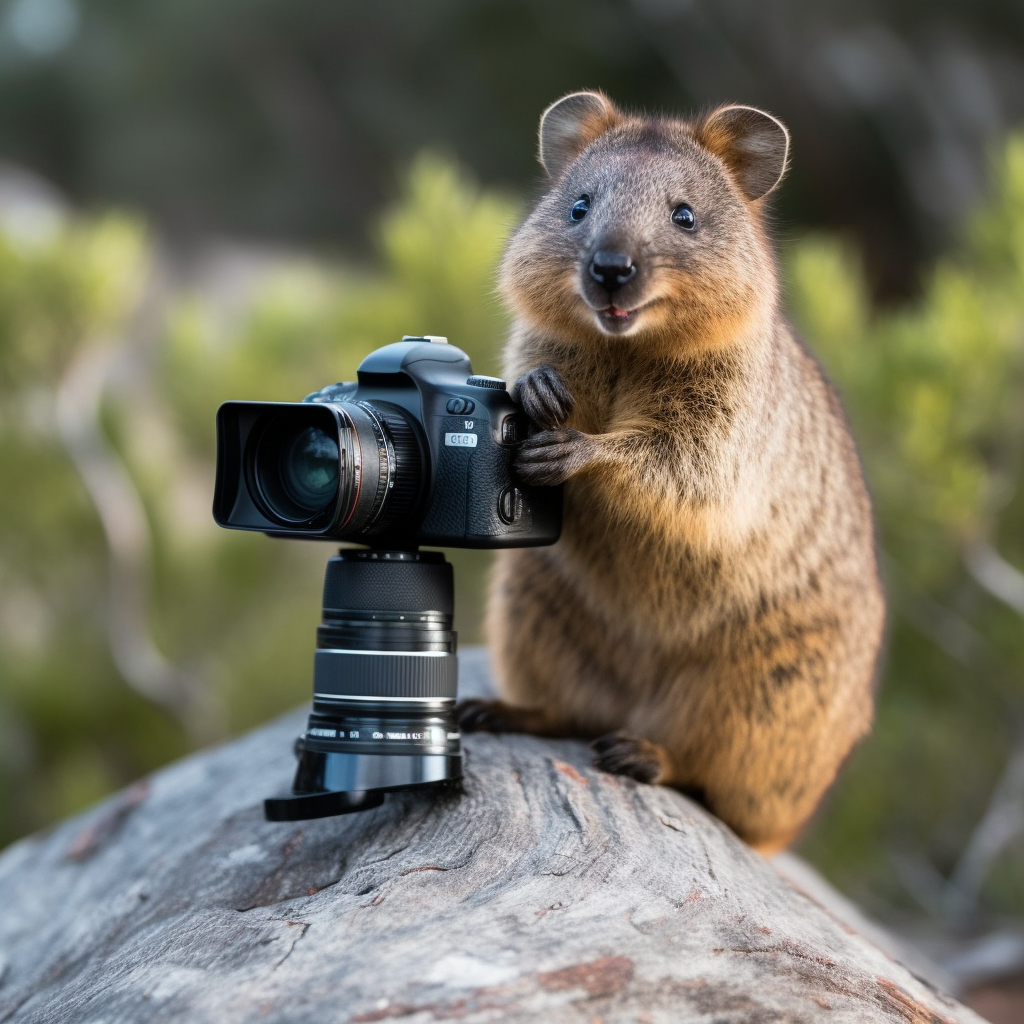
A. What Are Quokkas?
Quokkas are small marsupials that belong to the macropod family, which includes kangaroos and wallabies. These adorable creatures are native to Western Australia and are primarily found on Rottnest Island, as well as some parts of the mainland. Quokkas have become famous for their friendly and approachable nature, often referred to as “the happiest animal on Earth.”
B. Where Are Quokkas From and Where Are They Found?
Quokkas are endemic to Western Australia, specifically the southwestern region. They are most commonly found on Rottnest Island, located just off the coast of Perth, where the population is estimated to be around 10,000. However, quokkas can also be spotted on some smaller islands and in certain areas of the mainland, such as the forests and coastal heathlands of the South West region.
C. What Are Quokkas Known For?
Quokkas are known for their friendly and curious nature, which has earned them the reputation of being one of the most approachable animals in the world. They are often described as having a permanent smile on their face, thanks to their upturned mouth. This unique feature, combined with their small size and round shape, makes them incredibly endearing to both locals and tourists alike.
Quokkas have become famous for their photogenic qualities and their willingness to interact with humans. They are not afraid to approach people and are often seen hopping around visitors, seemingly posing for selfies. This behavior has made them popular on social media, with numerous photos of people smiling alongside these adorable creatures.
It’s important to note that while quokkas are generally friendly, they are still wild animals and should be treated with respect. It is crucial to remember that they are not domesticated pets and should not be handled or fed by humans. Respecting their natural habitat and keeping a safe distance is essential for both their well-being and ours.
In the next section, we will explore the behavior and safety considerations when interacting with quokkas.
The Unique Behavior of Quokkas
A. Why Are Quokkas Not Afraid of Humans?
Quokkas, the adorable marsupials native to Western Australia, have gained quite a reputation for their friendly and approachable nature. Unlike many other wild animals, quokkas do not exhibit fear or aggression towards humans. This unique behavior has made them popular among tourists and has even earned them the title of the “happiest animal on Earth.” But what makes quokkas so comfortable around humans?
One reason for the lack of fear in quokkas is their isolation from natural predators. Living on small islands and in protected reserves, quokkas have not had to develop a strong instinctual fear response. This absence of predators has allowed them to become more tolerant and curious towards humans.
Furthermore, quokkas have adapted to their environment by relying on their agility and speed rather than aggression. They are herbivores, feeding mainly on grasses and leaves, which means they do not pose a threat to humans. Their diet consists of plants found in their natural habitat, and they have no reason to view humans as a source of food or competition.
B. Why Are Quokkas So Friendly?
Quokkas’ friendliness can be attributed to their natural curiosity and social behavior. These small creatures are highly social and live in close-knit family groups. They are known to interact with each other in a playful and friendly manner, which extends to their interactions with humans.
Quokkas have a natural inclination to investigate their surroundings, including humans. They may approach people out of curiosity, especially if they perceive no threat. Their friendly behavior is often seen as a result of their social nature and their lack of fear towards humans.
It is important to note that while quokkas may appear friendly, it is crucial to respect their boundaries and not invade their personal space. Approaching them calmly and quietly, without making sudden movements or loud noises, is the best way to interact with them.
C. The “Happy” Quokka: Debunking the Myth
Quokkas have gained a reputation for their seemingly constant smile, leading to the misconception that they are always happy. While their facial expression may appear cheerful, it is important to understand that this is a natural feature of their anatomy and not necessarily an indicator of their emotional state.
Quokkas, like any other animal, experience a range of emotions and have their own individual personalities. While they may exhibit contentment and curiosity, it is essential to remember that they are still wild animals and should be treated with respect and caution.
Interacting with quokkas should be done responsibly and in a manner that ensures their safety and well-being. It is crucial to avoid feeding them or touching them, as this can disrupt their natural behavior and potentially harm them.
In conclusion, quokkas’ unique behavior of being unafraid and friendly towards humans can be attributed to their isolation from predators, their herbivorous diet, their social nature, and their natural curiosity. However, it is important to remember that they are still wild animals and should be treated with care and respect. Enjoy observing these fascinating creatures from a safe distance and appreciate the beauty of their natural behavior.
Are Quokkas Dangerous: Unraveling the Truth
A. Can Quokkas Kill You?
When it comes to the question of whether quokkas can kill humans, the answer is a resounding no. Quokkas are small marsupials that are native to Western Australia, and they pose no direct threat to human life. These adorable creatures, often referred to as the “happiest animals on Earth,” have a gentle nature and are known for their friendly behavior.
Quokkas primarily feed on grass and other vegetation, and they have no natural inclination to attack humans. They are herbivores, meaning they do not have the predatory instincts that would enable them to kill or harm humans. In fact, quokkas are generally quite docile and non-aggressive, making them safe to be around.
B. Are Quokkas Deadly?
Quokkas are not deadly animals. While they may have sharp teeth, their bite is not dangerous to humans. Quokkas are not known to carry any venom or diseases that could be harmful to humans. In the rare instances where a quokka may bite, it is usually a defensive reaction rather than an aggressive attack.
It is important to note that quokkas are a protected species, and it is illegal to harm or kill them. This protection ensures that quokkas can live safely in their natural habitat without posing any threat to humans.
C. Are Quokka Bites Dangerous?
While quokka bites can be painful, they are generally not dangerous. Quokkas have small, sharp teeth that they use for biting into vegetation. If a quokka feels threatened or cornered, it may bite as a defensive mechanism. However, these bites are unlikely to cause any serious harm to humans.
If you happen to get bitten by a quokka, it is important to clean the wound thoroughly and seek medical attention if necessary. Like any animal bite, there is a risk of infection, so it is always best to take proper precautions.
D. Are Quokkas Dangerous to Humans?
In general, quokkas are not dangerous to humans. They are friendly and curious creatures that are known to approach humans in search of food. However, it is important to remember that quokkas are wild animals and should be treated with respect and caution.
While quokkas may seem tame and approachable, it is crucial to maintain a safe distance and not attempt to touch or feed them. Interacting with quokkas should be done in a responsible and respectful manner to ensure the safety of both humans and the animals themselves.
In conclusion, quokkas are not dangerous creatures. They do not pose a threat to human life and are generally docile and non-aggressive. However, it is important to remember that they are wild animals and should be treated with care and respect. By maintaining a safe distance and observing them from afar, we can enjoy the presence of these adorable creatures while ensuring their well-being and our own safety.
The Survival Instincts of Quokkas
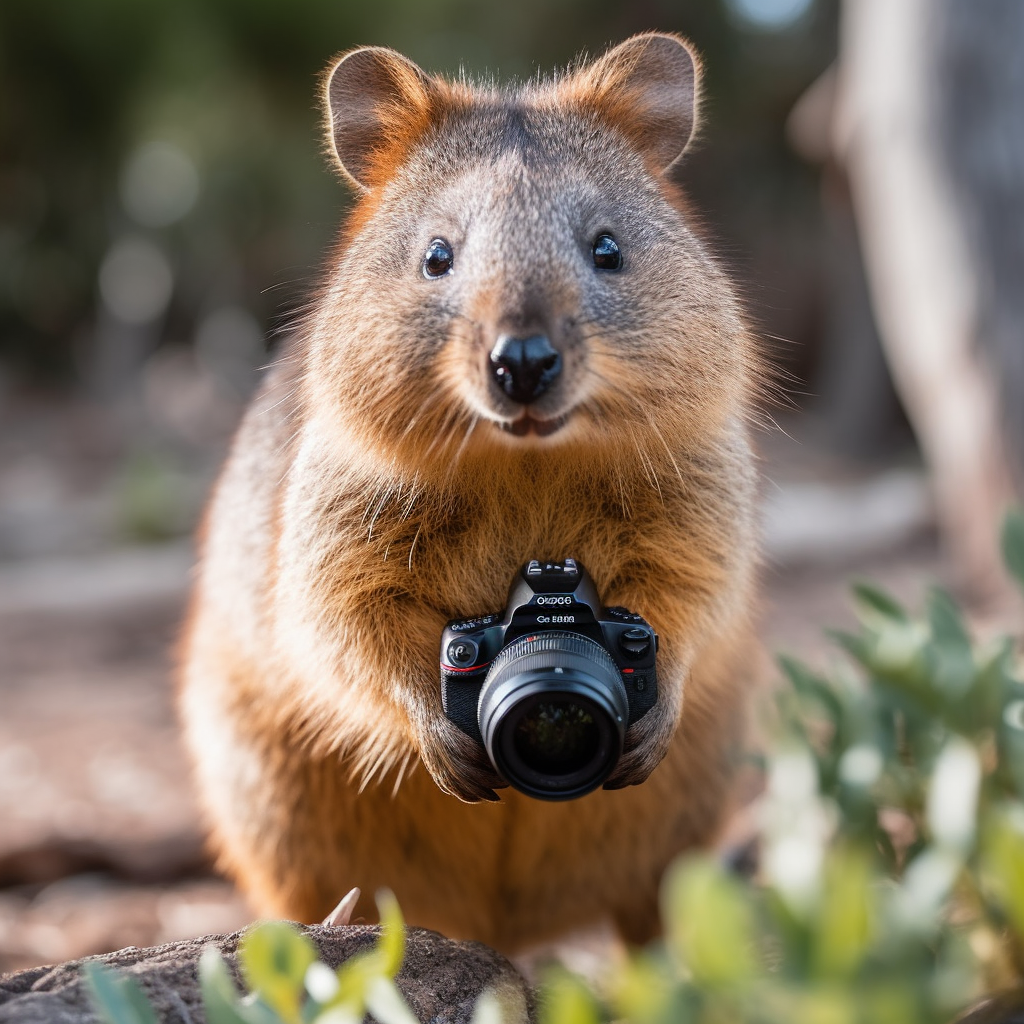
A. How Do Quokkas Escape Predators?
Quokkas, often referred to as the “happiest animal on Earth,” have developed remarkable survival instincts to evade predators in their natural habitat. These small marsupials, native to the southwestern region of Australia, have adapted various strategies to ensure their safety.
-
Camouflage: Quokkas possess a unique fur coloration that helps them blend seamlessly into their surroundings. Their brownish-gray fur, combined with their compact size, allows them to hide among the dense vegetation of their island homes.
-
Agile Climbing: Quokkas are skilled climbers and can quickly ascend trees and shrubs to escape potential threats on the ground. Their strong hind legs enable them to leap from branch to branch, making it difficult for predators to catch them.
-
Swift Movements: When faced with danger, quokkas can move with surprising speed. They can dart through the underbrush, utilizing their nimble bodies to navigate their way to safety.
-
Group Defense: Quokkas often live in small social groups, which provides them with added protection. When a predator approaches, the group members will emit warning calls to alert others, allowing them to flee collectively.
B. Are Quokkas Harmful to Other Species?
Despite their adorable appearance, quokkas are not harmful to other species. They are herbivores and primarily feed on grasses, leaves, and other vegetation. Their diet consists mainly of plants, making them harmless to other animals.
In fact, quokkas play a vital role in their ecosystem. As they graze on vegetation, they help maintain the balance of plant populations, preventing overgrowth in certain areas. This, in turn, benefits other herbivores who rely on the same resources.
Quokkas are known for their docile nature and friendly demeanor. They are not aggressive towards humans or other animals unless provoked or threatened. It is important to remember that they are wild animals and should be treated with respect and caution.
Interacting with quokkas can be a delightful experience, but it is crucial to maintain a safe distance and avoid feeding them human food. Feeding quokkas can disrupt their natural diet and lead to dependency on humans, which can have negative consequences for their overall well-being.
In conclusion, quokkas have evolved survival instincts that help them escape predators in their environment. They use camouflage, agility, and swift movements to evade danger. Additionally, quokkas are not harmful to other species and play a vital role in their ecosystem. It is important to appreciate these adorable creatures from a respectful distance and ensure their natural habitat remains protected.
The Conservation Status of Quokkas
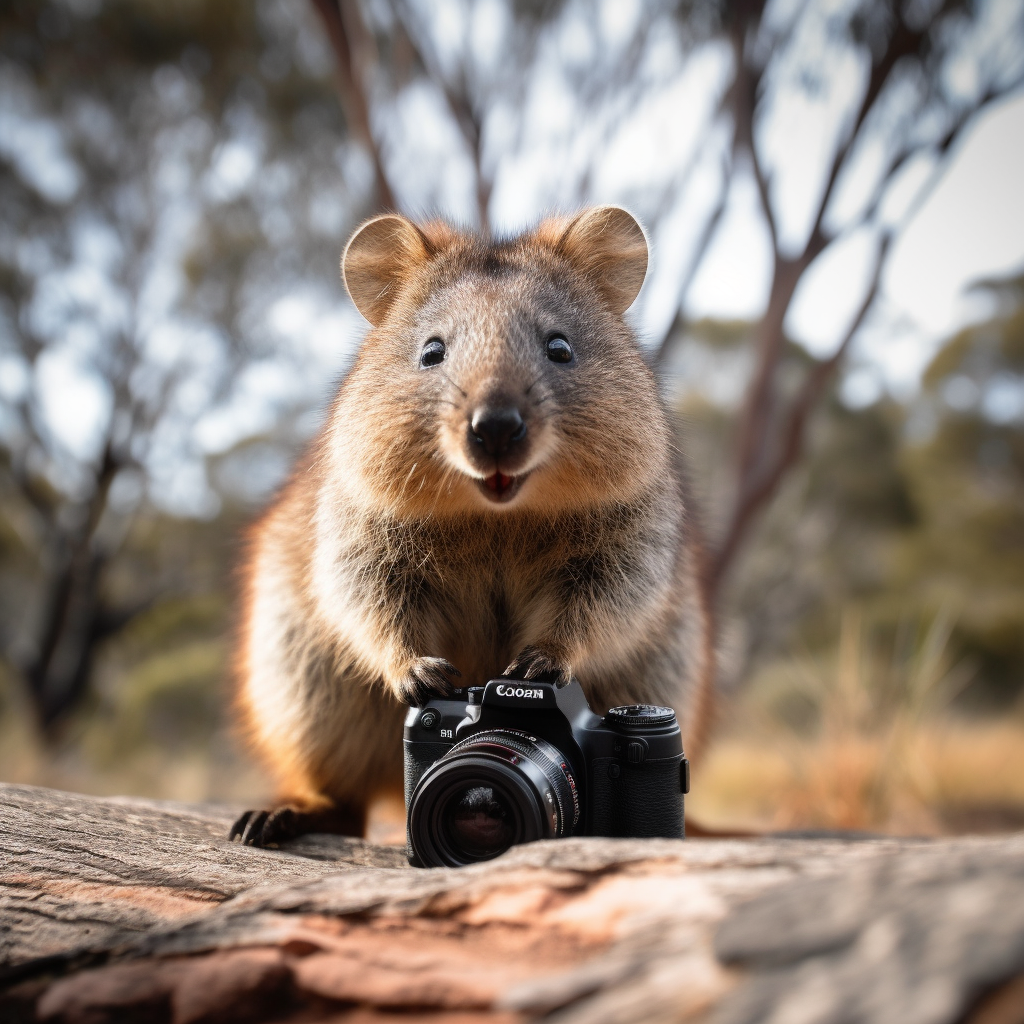
A. Are Quokkas Protected?
Quokkas, the small marsupials native to Western Australia, are indeed protected under both national and international laws. They are listed as a “vulnerable” species by the International Union for Conservation of Nature (IUCN) and are also protected under the Australian federal law. The Wildlife Conservation Act of Western Australia specifically safeguards the quokkas, recognizing their importance in the ecosystem and the need to preserve their population.
The protection of quokkas is crucial due to their limited habitat and vulnerability to human activities. These laws prohibit hunting, capturing, or harming quokkas in any way. It is illegal to kill, harass, or possess a quokka without proper authorization. Violators can face severe penalties, including fines and imprisonment. These legal measures aim to ensure the survival and well-being of these adorable creatures.
B. Why Are Quokkas Endangered?
Despite being protected, quokkas face several threats that contribute to their endangered status. The primary factor is the loss and fragmentation of their natural habitat. As human populations expand and urbanization increases, quokkas are losing their native vegetation and suitable living areas. This loss of habitat restricts their movement, reduces their food sources, and disrupts their breeding patterns.
Additionally, introduced predators, such as foxes and feral cats, pose a significant threat to quokkas. These predators prey on quokkas, further impacting their population. Quokkas have evolved in isolation, making them vulnerable to these introduced predators, which they have not evolved to defend against.
Human activities, such as tourism and development, also pose risks to quokkas. While tourism can bring attention and support for conservation efforts, it can also lead to negative impacts if not managed properly. Increased human interaction can disrupt quokka behavior and expose them to potential harm. It is crucial for visitors to respect the quokkas‘ natural behavior and maintain a safe distance to avoid causing stress or harm to these animals.
To address these challenges, conservation efforts focus on protecting and restoring quokka habitat, implementing predator control programs, and raising awareness about responsible tourism practices. By safeguarding their environment and managing human interactions, we can help ensure the survival of these unique and endearing creatures.
In conclusion, quokkas are protected under national and international laws due to their vulnerable status. Loss of habitat, introduced predators, and human activities pose significant threats to their population. Conservation efforts are essential to protect their habitat, control predators, and promote responsible tourism practices. By working together, we can secure a future for these delightful marsupials and preserve the biodiversity of Western Australia.
Pronunciation and Common Misconceptions
A. How is Quokka Pronounced?
When it comes to pronouncing the word “quokka,” you might be surprised to learn that it’s not as straightforward as it seems. The correct pronunciation is “KWOH-kuh.” The emphasis is on the first syllable, and the “o” is pronounced like the “o” in “hot.” The “u” is a short vowel sound, similar to the “u” in “put.” So, when you encounter this adorable creature, you can confidently refer to it as a “KWOH-kuh.”
B. Debunking the “Dangerous Quokka” Myth
There is a common misconception that quokkas are dangerous animals. However, this is far from the truth. Quokkas are generally docile and non-aggressive creatures. They have a reputation for being one of the friendliest animals in the world. So, where did this myth originate?
The myth of the “dangerous quokka” can be traced back to a few isolated incidents where individuals were bitten by quokkas. These incidents, although rare, garnered significant attention and led to the misconception that quokkas are aggressive or harmful to humans. It’s important to note that these incidents were exceptional cases and not representative of the quokka’s typical behavior.
Quokkas are wild animals, and like any wild creature, they may bite if they feel threatened or cornered. However, their natural behavior is to avoid conflict and retreat rather than engage in aggression. Quokkas are herbivores, primarily feeding on grass, leaves, and other vegetation. They are not predators and do not pose a threat to humans.
In fact, quokkas have become famous for their friendly and approachable nature. They are known to approach humans in search of food, which has led to their reputation as the “happiest animal on Earth.” Quokkas have become an iconic symbol of Western Australia, drawing tourists from around the world who are eager to interact with these adorable creatures.
It’s essential to remember that while quokkas may be friendly, they are still wild animals. It is crucial to treat them with respect and maintain a safe distance. Feeding quokkas is discouraged, as it can disrupt their natural diet and lead to dependency on human food. Additionally, it is important to avoid touching or picking up quokkas, as this can cause stress and potentially harm the animal.
In conclusion, the notion of quokkas being dangerous is a misconception. While they may bite if provoked, their natural behavior is non-aggressive. Quokkas are fascinating creatures that should be admired and appreciated from a respectful distance. By understanding their behavior and taking necessary precautions, we can ensure a safe and enjoyable experience when encountering these unique animals in their natural habitat. Conclusion
In conclusion, quokkas are generally not dangerous animals. They are known for their friendly and curious nature, often approaching humans without fear. Quokkas have a reputation for being one of the happiest animals on Earth, thanks to their perpetual smile. While they may defend themselves if they feel threatened, their small size and gentle demeanor make them unlikely to pose any real danger to humans. It’s important to remember that quokkas are wild animals and should be treated with respect and caution. If you ever have the opportunity to encounter a quokka in the wild, enjoy the experience but remember to keep a safe distance and not disturb their natural habitat. Quokkas are a unique and fascinating species that deserve our admiration and protection.
Frequently Asked Questions
Q1: What are Quokkas?
A: Quokkas are small marsupials native to a small corner of southwestern Australia. They are known for their friendly and curious nature, often approaching humans without fear.
Q2: Why are Quokkas not afraid of humans?
A: Quokkas have evolved on islands without natural predators, so they do not have an inherent fear of humans. However, this does not mean they are domesticated or safe to approach without caution.
Q3: Are Quokkas dangerous?
A: While Quokkas are generally not aggressive, they can bite or scratch when threatened or mishandled. It’s important to remember that they are wild animals and should be treated with respect.
Q4: Can Quokkas kill you?
A: No, Quokkas are not capable of killing humans. They are small animals and their primary defense is to flee rather than fight. However, they can cause minor injuries if they feel threatened.
Q5: Where are Quokkas located?
A: Quokkas are found in a few places in the southwestern part of Western Australia, particularly on Rottnest Island and Bald Island.
Q6: Are Quokka bites dangerous?
A: Quokka bites are not typically dangerous, but they can cause minor injuries. It’s important to avoid provoking them and to seek medical attention if bitten.
Q7: How do Quokkas escape predators?
A: Quokkas primarily rely on their agility and speed to escape predators. They are excellent climbers and can quickly scale trees and other obstacles when threatened.
Q8: Why are Quokkas so friendly?
A: Quokkas are known for their friendly demeanor, but this is largely due to their lack of natural predators. They are not domesticated and their interactions with humans should always be respectful and non-disruptive.
Q9: Are Quokkas protected?
A: Yes, Quokkas are protected under Australian law. It is illegal to harm or interfere with them in any way.
Q10: Are Quokkas harmful?
A: While Quokkas are not typically harmful, they can defend themselves if they feel threatened. It’s important to remember that they are wild animals and should be treated with respect.

